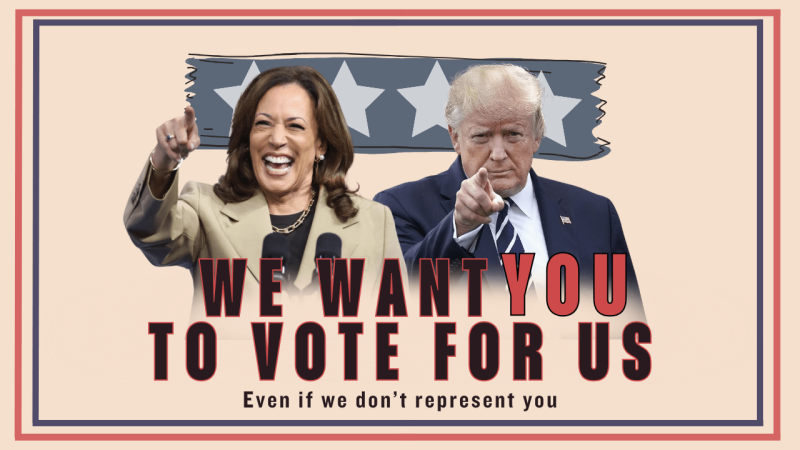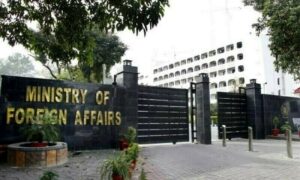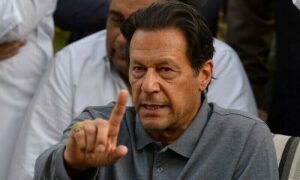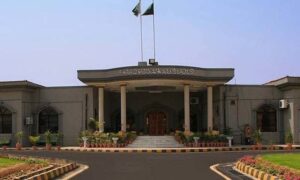“I feel extremely disillusioned,” said 26-year-old first-time voter Sara Ahmed* days before the next US presidential election on November 5. “It feels like there are two sides of the same coin at this point.”
With the 60th presidential election approaching, the Pakistani American community faces a dilemma — to vote for a system they distrust or risk empowering candidates they fear may exacerbate the situation in Gaza and the Middle East.
Ahmed is one of many young Pakistani Americans who will vote to decide the fate of American political leadership for the next four years. But seeing the crisis in Gaza and the US’ hand in it, many voters with an immigrant background feel their perspectives and concerns are increasingly being sidelined by both major political parties.
Through a series of interviews, young Pakistani Americans told Images how current US government policies, particularly in the Middle East, are shaping their views on the upcoming election. Their voices form a political identity that is often conflicted and now increasingly skeptical of both Republican and Democratic leadership.
A post-9/11 America
The sense of disillusionment has affected both newer citizens and those born and raised in the US.
Ayesha Malik*, a 24-year-old from Chicago, Illinois, has spent her life in the predominantly white and conservative suburbs of the American Midwest. Born and raised in the US to parents who immigrated from Pakistan 30 years ago, Malik’s political views are rooted in her experiences growing up in post-9/11 America.
“My experiences growing up were affected by post-9/11, feeling ashamed of my background, hearing white people talk about brown people as ‘terrorists,’ portraying Pakistan as a terrorist state,” she explained. She believes her South Asian identity is “directly tied” to her politics and feels that “being a person of colour is inherently political in the US.”
On the other hand, Ahmed, a communications professional from Pennsylvania who moved to the States six months ago, explained how her perspective on US politics differs from that of her family. While her parents viewed the US as a place of opportunity and “welcoming”, Ahmed’s experience in a post-9/11 America — with its heightened scrutiny and foreign policy entanglements in the Middle East — has left her disillusioned.
“My generation has never known an America without 9/11,” she said. “We have never experienced America without its invasive foreign policy, its influence on the Middle East, and views towards us Muslims specifically.”
Another first-time voter is Amani Khan, a 19-year-old student at the University of Michigan, who describes a more direct sense of disappointment that the US government’s support for Israel has garnered amongst her peers. There’s a push to vote third-party at her university. Khan and her family have always aligned with the Democratic Party, however, feel “upset by the US’ stance” on Middle East policy under the current administration.
“It’s sad to see the US not have Israel take any accountability,” she said.
“Neither political candidate, Kamala Harris nor Trump, has any kind of solid response to what’s going on,” Malik added, pointing to remarks made at Trump rallies where “people are saying that Palestinians have been taught to hate Americans at two years old.” She argued that Democrats have traditionally been seen as “more socially moral” but feels that “the ideology that the Democratic Party is representative of the people has totally lost its weight in this election”.
Unlike Malik and Khan, Bilal Hussain*, a 27-year-old IT engineer living in Wisconsin, has always leaned towards the Republican party. “We need to stop being so involved in this war,” he said of the situation in Palestine. After seeing the Biden administration’s response post-October 7, he stressed that he would “never trust the Democratic Party anymore. Obama killed millions of Muslims. Biden is killing millions of Muslims. Kamala will kill even more. They have terrible international affairs policies. We need a leader who can negotiate with foreign leaders to prevent war. “
Calling the Democratic party’s response to Israel’s ruthless bombardment of Gaza and now Lebanon “disgusting”, Hussain added that Harris’ side continues “to create the narrative where Israel is a victim”. “[Trump’s] stance is preferable over the Democratic Party since they just want to end the war and focus on our own problems in the US,” according to him.
Faraz Siddique, 26, a wealth/strategy consultant who immigrated from Pakistan to North Carolina in 2017, has always leaned left. Yet he now feels extremely betrayed by the Democratic Party’s stance on Gaza, “to the point where it makes sense to vote for the Green Party, but that means another vote wasted.” “Same as last time, this election revolves around voting for the lesser evil,” he lamented.
Enough of the two-party system
For these young Pakistani Americans, the limitations of the two-party system have reached a breaking point. Malik has chosen to vote for Green Party candidate Jill Stein. “I think it’s unrealistic that you will align with a political candidate completely,” she explained, “but [Stein] is the most progressive candidate that we have. At least she acknowledges Palestinian suffering; she at least calls it a genocide. None of the other political candidates have said anything like that.”
Reflecting on the limited choices within the two-party system, she added, “We have been voting for years and years, choosing a moderate candidate so we can reach a more progressive reform, but that never happens. We need to vote for radical candidates. Even if we can’t get them in office, we need to at least give them a platform.
“We know that the third-party candidate Jill Stein will certainly not win but it will be interesting to see how many votes she gets.”
Like Malik and Siddique, Ahmed also voiced her frustration with the lack of viable alternatives. “I don’t feel represented [by the two main parties]. It is also hard to be represented because the electoral college makes it kind of impossible to feel represented within your state. Or to directly vote for a candidate, there are so many barriers. You can’t really have any new candidates, you have to pick from what is chosen for you.
“I don’t think Trump is the same as Kamala, they do differ in their domestic policies but I don’t know […] if there would have been any tangible difference [in regards to Gaza] because this administration was responsible for what happened in Gaza and I do feel like if Trump was in charge, they would have also supported Israel in this,” she said.
She added that “in an ideal world, there would be a third-party candidate that would address the issues more effectively,” but she does not think that the current “system would allow that to happen”.
Nevertheless, she has decided to vote for a third-party candidate this election. “If you’d asked me four years ago or even two years ago, I would have definitely voted for Democrats […] I don’t agree with everything that they do, I don’t think they’re the best but between the two party options that we have, of course, I will vote for Democrats. But this time, I was not able to consciously talk myself into doing that.
“I know that maybe voting for a third party won’t be as impactful but I still wanted to make that choice and make that statement because consciously was not able to cast my vote for anybody else and I don’t think I am the only one. This time people have been pushed to take a stance further against both,” she explained.
“There should be a legitimate third party for voters who share views on both sides,” Hussain said. “It would be nice to have a different perspective to address major issues for the country, but this will never happen ultimately. There is too much risk and not enough people to vote for a third-party candidate.”
In spite of that, he feels represented by the Republican party even though he doesn’t agree with everything that the party stands for.
Khan acknowledged that the two-party system is “not ideal, compared to ranked-choice voting,” however, she feels it gives “most American voters the clear choice of having their voice heard in some way”.
“A circus”
The situation in Gaza have only intensified these frustrations. Multiple interviewees expressed a sense of betrayal and anger at the US government’s unwavering support for Israel, which they see as contributing to the humanitarian crisis. “The situation in Gaza has deteriorated my trust in the US government, not that there was much to begin with,” Ahmed scoffed. For her, watching some of the presidential debates felt like watching a “circus” where statements were “meaningless”.
Khan felt that both the responses by Harris and Trump’s sides were expected on the issues, given the US’ historic support of Israel, but as a democratically leaning voter, she felt especially disheartened. Malik believed this frustration was systemic, reflecting how Muslim communities “have been dying, begging, and pleading for some kind of visibility to just have a conversation with Kamala Harris.” But those attempts have been dismissed, leading to what Malik described as a lack of trust: “The democratic principles we are told about don’t exist anymore.”
Siddique said he was “disappointed and skeptical of what the VP actually believes in”.
“In all honesty, I don’t think they care, [Trump’s] stance is an act to gain the uninformed easily manipulated vote,” he said.
Looking for freedom of speech
Hussain felt that the response was “completely unfair”. He underscored that freedom of speech is under threat and “if anyone speaks out against what the government supports, their voices will be suppressed”.
Siddique echoed this sentiment, stating that “the US has always found ways to manipulate the Constitution, freedom of speech is a construct that depends on who’s in charge and what they believe in. The justice system always finds ways to use loopholes.”
“I do know that a lot of universities were under pressure to frame this as simply being an antisemitic movement. I am sure that there are factions of the movement who are used to be antisemitic but I also know that this is used as an excuse to derail the argument from what it actually is about,” said Ahmed. “Students should be able to protest peacefully without repercussions,” added Khan.
Not all South Asian Americans
The South Asian American community, though united by certain cultural values, features a broad spectrum of political beliefs. “I don’t think there’s such a thing as a ‘local’ South Asian community,” said Ahmed. “I feel like there are very different types of South Asians, and they have such varied experiences. I think within the Pakistani communities, again, being a Muslim has a very great impact on what your views are in this election.
“Even before Oct 7, the Palestinian cause has been a symbol of resistance for Muslims,” she explained. One’s proximity to certain issues influences how they are looking at these elections, according to the 26-year-old. “For some South Asians, Kamala being a woman of colour would be great to have in charge.”
For these young Pakistani Americans, however, their engagement in US politics is also driven by domestic concerns, from healthcare to economic policies. “I just wish that they would take a step back and focus on its internal issues,” Ahmed said. “The system of healthcare is broken, there is a housing crisis. All those things need to be addressed. There needs to be better focus on education.”
Hussain hopes that the government “focuses on improving the economy and stops funding wars internationally”. He believes that Trump could “bring back” former PM Imran Khan back into power in Pakistan and restore relations between the two countries.
While for some, Trump is the “lesser of the two evils”, others cannot imagine him back in the US presidential office. “All of us are really concerned about what the outcome of Tuesday will be,” Malik said.
“It is definitely very scary that Trump could come into power and Project 2025 would go underway,” Ahmed underscored. “Domestically, I do feel that Kamala would address concerns of South Asians or immigrant community better than Trump would.”
Khan mirrored this sentiment, stating that Democrats do address the concerns of the South Asian community in the US better than Republicans.
“But you know, the worst has already happened. Just because it is not happening here… There is nothing we can do to recover from what has already happened in Palestine and the Middle East in general. The amount of devastation that has already taken place under the Democratic party is so great,” added Ahmed.
It would not be an understatement to say that for these young Pakistani Americans it’s hard to find a way forward.
Their collective sentiments hint at a desire for an alternative to the existing system — one that is not “ fundamentally designed to exert power over others“, according to Ahmed. But whether such an option will emerge remains uncertain, and disillusionment is likely to continue going forward.
*Names changed for privacy.







